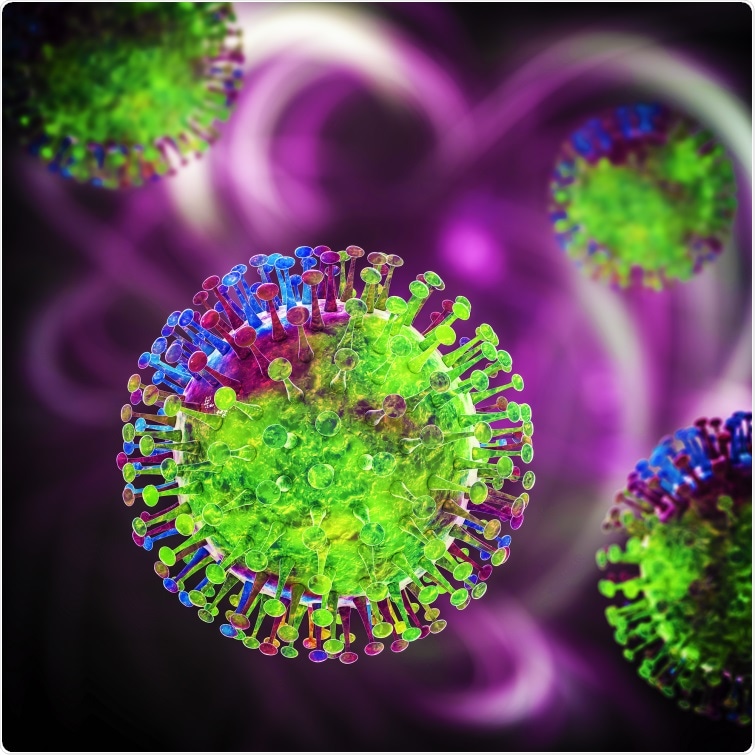Based on epidemiological field trials and the FrenchCOVID hospital cohort directed by Inserm, research teams from the Institut Pasteur, the CNRS, and the Vaccine Research Institute (VRI, Inserm/University Paris-Est Créteil) investigated the antibodies generated in people with symptomatic or asymptomatic SARS-CoV-2 infection.

Image Credit: AdobeStock
SARS-CoV-2 infection induces polyfunctional antibodies, demonstrated by the researchers. Apart from neutralization, these antibodies can trigger natural killer (NK) cells or the complement system, causing damage to infected cells.
Antibody levels are somewhat lower in asymptomatic individuals when compared to symptomatic people; however, polyfunctional antibodies were detected in all the individuals. These results demonstrate that SARS-CoV-2 infection produces antibodies that can destroy the infected cells irrespective of disease severity. The study was published in the Cell Reports Medicine journal on April 21st, 2021.
About 50% of those diagnosed with SARS-CoV-2 infection do not have any symptoms. However, the immune reaction mediated by asymptomatic variants of COVID-19 is still poorly understood. The degree to which antiviral roles of SARS-CoV-2 antibodies is also yet to be clearly defined.
Antibodies can both neutralize the virus and activate “non-neutralizing” activities. The latter comprises complement activation and antibody-dependent cellular cytotoxicity (ADCC), which are important components of the immune response and contribute to the efficacy of certain vaccines.
ADCC is a two-step mechanism where infected cells are initially identified by antibodies and subsequently killed by NK cells. The complement system contains a collection of plasma proteins that also help remove the cells attacked by antibodies. So far, the potential of antibodies to trigger such non-neutralizing functions has not been clearly explained for SARS-CoV-2 infection.
New assays were initially developed by the researchers from the Institut Pasteur, the CNRS, and the VRI (Inserm/University Paris-Est Créteil) to quantify the different antibody functions. The team created assays to investigate cell death caused by NK cells or by the complement system in the presence of antibodies.
The researchers analyzed live cultures using video microscopy and demonstrated that NK cells destroy the infected cells in the presence of antibodies, revealing novel antiviral activity used by SARS-CoV-2 antibodies.
They subsequently used their new assays to analyze the serum of patients with asymptomatic or symptomatic form s of COVID-19. The team also used techniques that were previously designed at the Institut Pasteur, including the S-Flow assay to identify SARS-CoV-2 anti-spike antibodies, and the S-Fuse assay to quantify the neutralization potential of these antibodies.
This study demonstrated that individuals infected with SARS-CoV-2 have antibodies that are capable of attacking the virus in different ways, by preventing it from entering cells (neutralization) or by activating NK cells to kill infected cells (via ADCC). We therefore use the term polyfunctional antibodies.”
Timothée Bruel, Study Co-Author and Scientist, Virus & Immunity Unit, Institut Pasteur
The team compared different groups of patients and demonstrated that asymptomatic persons also have polyfunctional antibodies and that their reaction is significantly lower than those who have mild forms of COVID-19.
The study reveals new mechanisms of action of SARS-CoV-2 antibodies and suggests that the protection induced by an asymptomatic infection is very close to that observed after a symptomatic infection.”
Olivier Schwartz, Study Co-Last Author and Head, Virus & Immunity Unit, Institut Pasteur
Schwartz is also the head of VRI.
Anticorps tuant les cellules infectées par le SARS-CoV-2 en activant les cellules NK
Video Credit: Institut Pasteur.
Source:
Journal reference:
Dufloo, J., et al. (2021) Asymptomatic and symptomatic SARS-CoV-2 infections elicit polyfunctional antibodies. Cell Reports Medicine. doi.org/10.1016/j.xcrm.2021.100275.